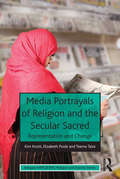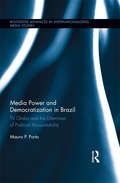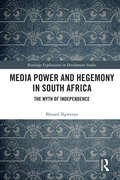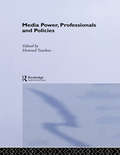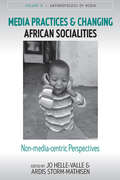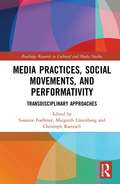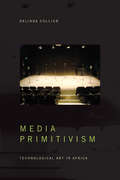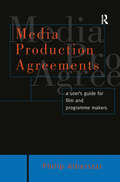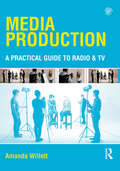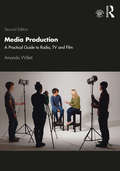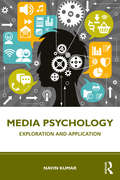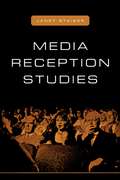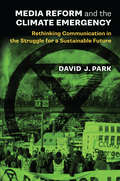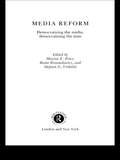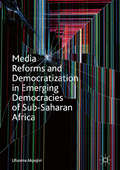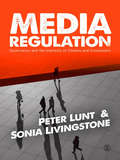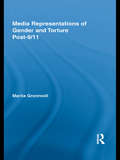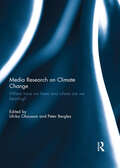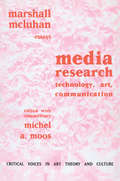- Table View
- List View
Media Portrayals of Religion and the Secular Sacred: Representation and Change (AHRC/ESRC Religion and Society Series)
by Kim Knott Elizabeth PooleIs it true that Christianity is being marginalised by the secular media, at the expense of Islam? Are the mass media Islamophobic? Is atheism on the rise in media coverage? Media Portrayals of Religion and the Secular Sacred explores such questions and argues that television and newspapers remain key sources of popular information about religion. They are particularly significant at a time when religious participation in Europe is declining yet the public visibility and influence of religions seems to be increasing. Based on analysis of mainstream media, the book is set in the context of wider debates about the sociology of religion and media representation. The authors draw on research conducted in the 1980s and 2008-10 to examine British media coverage and representation of religion and contemporary secular values, and to consider what has changed in the last 25 years. Exploring the portrayal of Christianity and public life, Islam and religious diversity, atheism and secularism, and popular beliefs and practices, several media events are also examined in detail: the Papal visit to the UK in 2010 and the ban of the controversial Dutch MP, Geert Wilders, in 2009. Religion is shown to be deeply embedded in the language and images of the press and television, and present in all types of coverage from news and documentaries to entertainment, sports reporting and advertising. A final chapter engages with global debates about religion and media.
Media Power and Democratization in Brazil: TV Globo and the Dilemmas of Political Accountability (Routledge Advances in Internationalizing Media Studies)
by Mauro PortoIn this book, Porto analyzes the role of TV Globo in the democratization of Brazil. TV Globo, one of the world's largest media conglomerates, has a dominant position in Brazil's communications landscape. It also exports telenovelas to more than 130 countries and has established joint ventures with transnational media conglomerates. Beginning in the mid-1990s, TV Globo began a process of "opening," replacing its authoritarian model of journalism with a more independent reporting style. Representations of Brazil in prime time telenovelas have also shifted. Given this shift, Porto considers some of the following questions: •What explains these changes in Brazil's most powerful media company? •How are they related to processes of political and social democratization? •How did TV Globo's opening affect Brazil's emerging democracy, especially in terms of the quality of political accountability mechanisms? Porto uses the Brazilian case of TV Globo to analyze the larger links between democratization, civil society mobilization, and media change in transitional societies.
Media Power and Hegemony in South Africa: The Myth of Independence (Routledge Explorations in Development Studies)
by Blessed NgwenyaThis book critically explores how meanings of ‘independence’ are constructed and reconfigured by public service broadcasters in the global south, with a particular focus on the South African Broadcasting Corporation (SABC). Blessed Ngwenya questions the institutional, political economy and world systems paradigms born out of coloniality which continue to influence broadcasting and media in the global south, and instead presents a radical local understanding of freedom in the present day. The author draws on detailed empirical interviews with members of staff from across the SABC, including board members, senior management, and journalists, offering an intimate insight into how the participants themselves perceive, understand, and deal with the issues and problems they face in relation to independence. Framed by a rich analysis of the historical context, this book provides readers with the theoretical and empirical toolkit needed to place the everyday experiences and needs of their subjects first, and to ultimately arrive at an accurate understanding of independence in its several senses. Contributing to growing global debates on the decolonisation of knowledge, this book is critical reading for advanced scholars and researchers of African media, culture, communication and epistemic freedom.
Media Power and its Control in Contemporary China: The Digital Regulatory Regime, National Identity, and Global Communication (IPP Studies in the Frontiers of China’s Public Policy)
by Yanling ZhuThis book takes an ethnographic approach to discuss the policy practices within China’s broadcasting industry. Exploring the gap between the contemporary policy regime and its implementation in national broadcasters and streaming services, taking into account the interplay between broadcasters, political bodies, producers and audiences, Zhu explains the contemporary role of Chinese national broadcasters in mediating the public discourse, the collective reimagining of China’s national identity, and the newly-found policy initiative of using state media as a means of nation branding. Cases investigated include China Central Television (CCTV) Documentary, China Global Television Network (CGTN), and the Shanghai Media Group (SMG), as well as co-productions made by CCTV and international media firms, including the BBC, Discovery and the Japan Broadcasting Corporation (NHK), in a book that will interest scholars of Chinese politics, media studies, and sociology.
Media Power and the Transformation of War
by Chiara De FrancoDo the news media have any role in the transformation of war and warfare? Focusing on television, this book argues that the news media alters the cognitive and strategic environment of the actors of war and politics and therefore changes the way these interact with one another.
Media Power in Hong Kong: Hyper-Marketized Media and Cultural Resistance (Routledge Contemporary China Series)
by Charles Chi-wai CheungStudies of Hong Kong media primarily examine whether China will crush Hong Kong’s media freedom. This book however traces the root problem of Hong Kong media back to the colonial era, demonstrating that before the resumption of Chinese sovereignty there already existed a uniquely Hong Kong brand of hyper-marketized and oligopolistic media system. The system, encouraged by the British colonial government, was subsequently aggravated by the Chinese government. This peculiar system is highly susceptible to state intervention and structurally disadvantaged dissent and marginal groups before and after 1997. The book stresses that this hyper-marketized media system has been constantly challenged. Through a historical study of media stigmatization of youth, this book proposes that over the years various counter forces have penetrated the structurally lopsided Hong Kong media: independent, public, popular and news media all make occasional subversive alliances to disrupt the mainstream, and news media, with a strong liberal professionalism, provide the most subversive space for challenging cultural hegemony. The book offers an alternative and fascinating account of the dynamics between hegemonic closure and day-to-day resistance in Hong Kong media in both the colonial and post-colonial eras, arguing that the Hong Kong case generates important insights for understanding ideological struggles in capitalist media.
Media Power, Professionals and Policies
by Howard TumberThe work of Jeremy Tunstall, one of the founding fathers of British media studies, is the inspiration behind Media Power, Professionals and Policies. In this collection of new work, leading international contributors address the central themes of Tunstall's work; the history, structures and practices of the international media industry, the relationship between media and government, and the sociology of labour in the media industry.
Media Practice in Iraq
by Ahmed K. Al-RawiA historical survey of the Iraqi media from its beginning up to the present day, focusing on the post-2003 media scene and the political and societal divisions that occurred in Iraq after US-led occupation. Investigates the nature of the media outlets and offers an analysis of the way Iraqi satellite channels covered the 2010 general elections.
Media Practices and Changing African Socialities: Non-media-centric Perspectives (Anthropology of Media #9)
by Jo Helle-Valle Ardis Storm-MathisenDeriving from innovative new work by six researchers, this book questions what the new media's role is in contemporary Africa. The chapters are diverse - covering different areas of sociality in different countries - but they unite in their methodological and analytical foundation. The focus is on media-related practices, which require engagement with different perspectives and concerns while situating these in a wider analytical context. The contributions to this collection provide fresh ethnographic descriptions of how new media practices can affect socialities in significant but unpredictable ways.
Media Practices, Social Movements, and Performativity: Transdisciplinary Approaches (Routledge Research in Cultural and Media Studies)
by Margreth Lünenborg Susanne Foellmer Christoph RaetzschAs individuals incorporate new forms of media into their daily routines, these media transform individuals’ engagement with networks of heterogeneous actors. Using the concept of media practices, this volume looks at processes of social and political transformation in diverse regions of the world to argue that media change and social change converge on a redefinition of the relations of individuals to larger collective bodies. To this end, contributors examine new collective actors emerging in the public arena through digital media or established actors adjusting to a diversified communication environment. The book offers an important contribution to a vibrant, transdisciplinary, and international field of research emerging at the intersections of communication, performance and social movement studies.
Media Primitivism: Technological Art in Africa (The Visual Arts of Africa and its Diasporas)
by Delinda CollierIn Media Primitivism Delinda Collier provides a sweeping new understanding of technological media in African art, rethinking the assumptions that have conceptualized African art as unmediated, primary, and natural. Collier responds to these preoccupations by exploring African artworks that challenge these narratives. From one of the first works of electronic music, Halim El-Dabh’s Ta’abir Al-Zaar (1944), and Souleymane Cissé's 1987 film, Yeelen, to contemporary digital art, Collier argues that African media must be understood in relation to other modes of transfer and transmutation that have significant colonial and postcolonial histories, such as extractive mining and electricity. Collier reorients modern African art within a larger constellation of philosophies of aesthetics and technology, demonstrating how pivotal artworks transcend the distinctions between the constructed and the elemental, thereby expanding ideas about mediation and about what African art can do.
Media Production Agreements: A User's Guide for Film and Programme Makers
by Philip AlberstatMedia Production Agreements is an invaluable reference tool for film, television and video producers and has been written specifically for all those involved in the media industry. Providing legal information and sound advice on the structuring of deals and negotiated agreements, this authoritative guide identifies potential pitfalls in the drafting and arrangement of contracts and proposals.Media Production Agreements contains legal agreements which independent producers, writers and all those involved in the film and television industry are faced with at the outset of a project. Typical agreements and sample contracts are presented in the text and practical explanatory notes provide clarification, caveats and advice.Contracts and agreements discussed include:* option and literary purchase* writer's and director's agreement* co-production agreement* distribution agreement* location agreement* non-disclosure agreement* release from a living person* release for extras* name product and logo release agreement* licence to reproduce still photographs.
Media Production: A Practical Guide to Radio & TV
by Amanda WillettMedia Production is an introductory guide to radio, TV and film production techniques. Illuminating the step by step process from conception to delivery, from the initial brainstorms, through planning, research and editing, this book creates a guided structure to help students learn about media production. Aimed at those producing radio, film or TV productions for the first time, this book offers relevant advice which takes account of the context in which students work and the type of equipment available to them. Supported by online resources, this textbook provides templates, notes and exercises to help students prepare for their own productions, as well as a video and audio library showcasing techniques, interviews and behind the scenes industry footage.
Media Production: A Practical Guide to Radio, TV and Film
by Amanda WillettFully revised and updated, this second edition of Media Production provides a comprehensive introductory guide to radio, television and fi lm production techniques. Using a step-by-step structure that takes students through the production process from conception to delivery, this book explores initial brainstorming through to planning, research, recording and editing. Operational procedures are set out in detail, taking into account the context in which students work and the type of equipment available to them. Clear instructional photographs are provided to illustrate key teaching points. Written by an experienced BBC producer and director, this textbook is ideal for FE Media students as well as those just starting out in the industry. Updated online resources include templates, notes and exercises to help students prepare for their own productions, as well as a glossary of key terms and helpful weblinks.
Media Psychology: Exploration and Application
by Navin KumarThis book examines media psychology as a field of study and provides a fundamental understanding of its emergence and application. It covers various key themes such as consumer behavior, mass media and advertising, media and culture, media messages and their effects on individual and group behavior in the Indian context. It highlights the role of media psychology with reference to citizenship and pedagogy and studies the emerging concept of digital altruism. The author also discusses various research methods used in this field that help to objectively evaluate the impact of mass media messages on people and people’s effect on the functioning of mass media. This comprehensive book will be useful to students and researchers of psychology, media psychology, mass-communication, consumer behavior, digital marketing, corporate communication, and media studies.
Media Reception Studies
by Janet StaigerA broad survey on how audiences make meaning out of mass mediaMedia Reception Studies broadly surveys the past century of scholarship on the ways in which audiences make meaning out of mass media. It synthesizes in plain language social scientific, linguistic, and cultural studies approaches to film and television as communication media.Janet Staiger traverses a broad terrain, covering the Chicago School, early psychological approaches, Soviet theory, the Frankfurt School, mass communication research and critical theory, linguistics and semiotic theory, social-psychoanalytical research, cognitive psychology, and cultural studies. She offers these theories as a set of tools for understanding the complex relationships between films and their audiences, TV shows and their viewers. She explains such questions as the behavior of fans; the implications of gender, sexuality, and race/ethnicity with regard to the media; the effect of violence, horror, and sexually explicit images on viewers; and the place of memory in spectatorship. Providing an organized and lucid introduction to a staggering amount of work, Media Reception Studies is an indispensable resource for anyone interested in understanding the effects of mass media.
Media Reform and the Climate Emergency: Rethinking Communication in the Struggle for a Sustainable Future
by David ParkAward-winning author David J. Park argues that the battle against global warming is also a fight for media reform. With his new book Media Reform and the Climate Emergency: Rethinking Communication in the Struggle for a Sustainable World, he critically examines how advertising, the digital infrastructure, and journalism advance the climate emergency and lays out a path of reform to help create a more sustainable world. The production and consumption of goods and services within consumer societies lead to unsustainable greenhouse gas emissions, and Park finds that much of mass communication is either dependent upon or closely tied to the success of this social organization. As a result, he suggests successful environmental movements creatively dismantle or reform institutional infrastructures that extend the planetary global warming crisis and the unsustainable consumption of nature. Communication policies and industries are part of these infrastructures. Advertising evolved to propel a new consumer society that would encourage the over-consumption of goods and services with harmful and unsustainable production processes. Our digital infrastructure is largely premised upon the surveillance of online consumer habits and preferences, with the goal to create individualized messages to more effectively persuade people to increase their consumption habits. Much of commercial journalism resists the drastic and immediate regulatory changes necessary to address the worst aspects of this crisis. This is because so many of the needed changes challenge the media’s source of income, their libertarian philosophy, and the general status quo, which is preferred by elites. Bound to foster conversations among scholars, activists, politicians, and those who work in the communication industries, this book rethinks mass communication and highlights how immediate reform is needed in the struggle for a sustainable planet.
Media Reform: Democratizing the Media, Democratizing the State (Routledge Research in Cultural and Media Studies #Vol. 9)
by Monroe E. Price Stefaan G. Verhulst Beata RozumilowiczUsing examples of media from a range of countries in Latin America, Europe, Asia and Africa including Uruguay, Poland, China, Indonesia, Jordan and Uganda, Media Reform considers the social and cultural implications of a free and independent media.
Media Reforms and Democratization in Emerging Democracies of Sub-Saharan Africa
by Ufuoma AkpojiviThis book examines the media reform processes and re-democratization projects of Ghana and Nigeria’s emerging democracies. It evaluates and critiques these reform processes, arguing that because of dependency approaches resulting from the transplanting of policy framework from the West into these emerging democracies, the policy goals and objectives of the reforms have not been achieved. Consequently, the inherent socio-cultural, economic and political factors, coupled with the historical antecedents of these countries, have also affected the reform process. Drawing from policy documents, analyses and interviews, Ufuoma Akpojivi argues that the lack of citizens’ active participation in policy processes has led to neo-liberalization and the continued universalization of Western ideologies such as democracy, media freedom and independence. Akpojivi posits that the recognition of socio-cultural, political and economic factors inherent to these emerging democracies, coupled with the communal participation of citizens, will facilitate true media reform processes and development of these countries.
Media Regulation: Governance and the Interests of Citizens and Consumers
by Sonia Livingstone Peter LuntIn Media Regulation, two leading scholars of the media examine the challenges of regulation in the global mediated sphere. This book explores the way that regulation affects the relations between government, the media and communications market, civil society, citizens and consumers. Drawing on theories of governance and the public sphere, the book critically analyzes issues at the heart of today's media, from the saturation of advertising to burdens on individuals to control their own media literacy. Lunt and Livingstone incisively lay bare shifts in governance and the new role of the public sphere which implicate self-regulation, the public interest, the role of civil society and the changing risks and opportunities for citizens and consumers. It is essential reading to understand the forces that are reshaping the media landscape.
Media Representations of Anti-Austerity Protests in the EU: Grievances, Identities and Agency (Routledge Research in Cultural and Media Studies)
by Suman Gupta Tao PapaioannouThis book analyzes constructions of injustice, group identification and participation in news and social media in anti-austerity protests within the European Union (EU). Since 2008, EU member-states have witnessed waves of protests and demonstrations against the adoption of austerity measures and alignment of domestic economies with the prevailing global neoliberal order. Understanding how the media represents dissent and how it influences public deliberation is of critical importance. It is accordingly necessary to explore the strategies deployed and role played by news and social media in representing and perhaps acting upon anti-austerity protests in the Eurozone crisis. This volume undertakes such a critical exploration.
Media Representations of Gender and Torture Post-9/11 (Routledge Studies In Rhetoric And Communication Ser. #4)
by Marita GronnvollIn this timely book, Gronnvoll offers a feminist rhetorical examination of gender and torture, looking at the media coverage of Abu Ghraib and Guantánamo Bay, as well as recent popular entertainment television serials where torture appears as a plot device (including 24). In exposing news media coverage to such scrutiny, she finds that cases of American personnel engaging in torture achieved notoriety chiefly because of the fact that women were perpetrators. The language of commentators suggests at least as much social outrage over the gender performance of the women as over the fact of torture being committed by Americans. At the same time, political and social discourses sketch a portrait of an intractable enemy in the form of the Muslim "Other" and betray a longing for a savior warrior hero who is capable of prevailing over this perceived "evil." Yet, news coverage of Abu Ghraib and Guantánamo Bay suggests women warriors are socially perceived as lacking the necessary qualifications to be such saviors. This finding provides a transition into an examination of popular entertainment television programs that feature male and female heroes as government agents engaged in fighting the war on terrorism. Ultimately, Gronnvoll's analysis suggests that a Western cultural longing for a savior is partially fulfilled through fictional programming portrayals of masculine warriors who engage in torture and remain heroic.
Media Representations of Macau’s Gaming Industry in Greater China: A Corpus-based Critical Discourse Analysis
by Yuxi WuThis book is the first linguistic study that combines CL and CDA to compare the media representations of Macau’s gaming industry in English-language newspapers published in Mainland China, Hong Kong, and Macau. An analytical framework based on the notion of the extended units of meaning of a lexical item (Sinclair, 2004) is adopted to examine the ideological stances regarding Macau’s gaming industry among three English-language newspapers published in the three Chinese territories mentioned above by comparing the patterns of co-selection of shared and unique words and phraseologies. The book’s findings confirm that the news media in these three territories differ in their ideological stances. Moreover, the book offers readers a fresh perspective on Macau by exploring how the region and its gaming industry are represented in three news article corpora. Thus, it provides unique insights into the similarities and differences among these three territories. Further, the research suggests that the methods adopted in this book can be replicated to examine and compare the news and political discourses in a variety of contexts. Accordingly, the book represents a valuable resource not only for students majoring in linguistics, media studies, communication, journalism, etc., but also for researchers in the fields of corpus linguistics, critical discourse analysis, etc.
Media Research on Climate Change: Where have we been and where are we heading?
by Ulrika Olausson and Peter BerglezResearch on media coverage of climate change, as a particular subfield of environmental communication research, has proliferated over the past decade. This book sets out to consider what conclusions can be drawn in light of the existing body of work, what lessons can be learnt, what are the challenges to be met, and what are the directions to be taken in order to further develop media research on climate change. The mixture of articles in this volume serve well to illustrate the range of empirical, theoretical, and methodological approaches subsumed under the broad heading of "media studies on climate change." Some contributions focus on the past—how the subfield has developed and what we can learn from that—and some look toward the future. Either way, all the authors share the ambition to suggest important avenues of research, be they centered on media, context, applicability of results, or theoretical advancement. As such they make a valuable contribution to identifying important directions for future research on the role of the media in communicating climate change. This book was previously published as a special issue of Environmental Communication.
Media Research: Technology, Art and Communication (Critical Voices in Art, Theory and Culture)
by Marshall McLuhanHerbert Marshall McLuhan (1911-1980) received his PhD in English literature from Cambridge University and taught in the United States and Canada. He is best known, however, as the founding father of media studies. McLuhan was Director of the Center for Culture and Technology at the University of Toronto. Among his ground-breaking works on the psychic and social dimensions of communication technology are The Gutenberg Galaxy (1962); Understanding Media: the Extensions of Man (1964); and The Medium Is the Massage: An Inventory of Effects (1967). Michel Moos' premise is that Marshall McLuhan's importance derives from his achievements in rethinking the entire process of education and training itself, not with his popular fame as media guru, and he analyzes McLuhan's work from the feedback effect his vision continues to provide, rather than from the perspective of interpreting McLuhan's pronouncements on the electronic media. Moos contrasts McLuhan's thoughts with those of such thinkers as Roland Barthes, Fredric Jameson, Friedrich Kittler, Donna Haraway, and Deleuze and Guattari, and renders an updated account of the effect of the mass media on our society and ourselves. The concept "the medium is the message" is the hub around which Marshall McLuhan's explorations revolved. McLuhan's interests ranged from sixteenth-century literature to twentieth-century business practices. With wit and literary flair, he reported the media's influence on society and on the individual. He concluded that we could not escape being transformed by the forces that are hidden deeply within the electronic telecommunications revolution of the sixties. For McLuhan, the new mediums of film, television, and the emerging realm of the digital were the modern equivalent of Gutenberg's printing press. Essays by M. McLuhan. Edited and with a Commentary by M.A. Moos.
